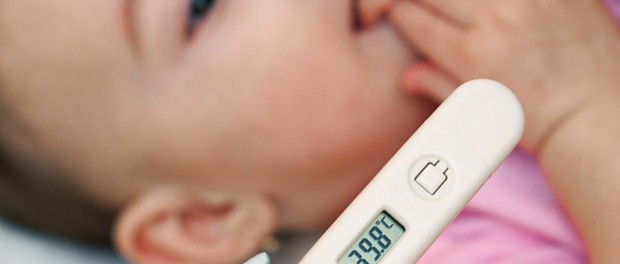Fever in Infants

Fevers are usually a sign of a viral or bacterial infection. A fever could result from vaccinations as well. Sometimes a fever is associated with aches and pains that can be localized to a certain part of the body or widespread. These pain’s should improve as the virus or infection gets better.
Treatment
Ibuprofen and acetaminophen are good medicines to treat fevers and aches and pains. These medicines are usually able to reduce fevers as well. You should consult your doctor to determine the appropriate medicines and the proper dosage as ibuprofen isn’t recommended for children under 6 months. Dosing for both medicines take into account weight and age.
When your child has a fever, keep him cool. Have a thin layer of clothing on them and use room temperature water to sponge them off if needed. Never put your child in a cold bath to bring down their temperature as this can change the body temperature quickly and make your child go into shock. Make sure they are drinking plenty of fluids so they don’t get dehydrated, and keep checking their temperature as recommended.
When to See the Doctor
If the fever lasts more than 3 days, you should always see a doctor. If your child is crying constantly, not eating well, or overly tired you should also see the doctor. Sometimes fevers can cause seizures, which is something that you should see a doctor or go to the hospital for immediately.
If your child has a high or sudden fever, keep an eye out for meningitis. Symptoms include a stiff neck, purplish-red spots on the skin, and an intense headache that won’t go away. It can also cause vomiting or nausea, confusion, and seizures. Meningitis can affect any age, even newborns. There are two types of meningitis- viral and bacterial. Viral meningitis may not require treatment, but the bacterial form is very serious and requires treatment. Either way, remember that meningitis need immediate medical attention.
